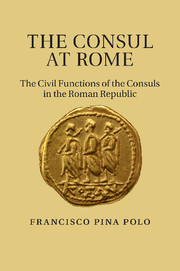Book contents
- Frontmatter
- Contents
- List of illustrations
- Acknowledgements
- Introduction
- PART I THE CONSULAR FUNCTIONS IN THE PRE-SULLAN AGE (367–81)
- PART II THE CONSULAR FUNCTIONS IN THE POST-SULLAN AGE (80–50)
- 12 The supposed lex Cornelia de provinciis ordinandis and the presence of consuls in Rome in the post-Sullan period
- 13 Consular functions from the year 80 to 50
- 14 The consular year in the post-Sullan period
- 15 Conclusion
- Bibliography
- Index of Subjects
- Index of Ancient Sources
- Index of Ancient Personal Names
12 - The supposed lex Cornelia de provinciis ordinandis and the presence of consuls in Rome in the post-Sullan period
Published online by Cambridge University Press: 25 October 2011
- Frontmatter
- Contents
- List of illustrations
- Acknowledgements
- Introduction
- PART I THE CONSULAR FUNCTIONS IN THE PRE-SULLAN AGE (367–81)
- PART II THE CONSULAR FUNCTIONS IN THE POST-SULLAN AGE (80–50)
- 12 The supposed lex Cornelia de provinciis ordinandis and the presence of consuls in Rome in the post-Sullan period
- 13 Consular functions from the year 80 to 50
- 14 The consular year in the post-Sullan period
- 15 Conclusion
- Bibliography
- Index of Subjects
- Index of Ancient Sources
- Index of Ancient Personal Names
Summary
The central question in the second and shorter part of this monograph is the same as in the first: to determine exactly what the consuls did during their term of office. In order to try to answer this question we must discuss, as an initial step, the supposed existence of a lex Cornelia de provinciis ordinandis, which presumably would have modified, from Sulla's dictatorship onwards, the powers and functions of consuls. It was Mommsen who put forward the doctrine which was accepted for decades and which continues to be the starting point of the analysis carried out by many scholars. According to Mommsen, who took as his starting point the distinction he drew between imperium domi as an exclusively civil power within the Urbs, and imperium militiae as a military power beyond the pomerium, Sulla sponsored during his dictatorship a law on the government of provinces whereby the power to govern a province was removed from consuls and praetors and they were forced to remain in Rome. Only once their term of office had expired would they receive military command as proconsuls or propraetors in a province. Therefore, according to Mommsen, from Sulla onwards the consuls lost their military imperium, and there was a clear difference between the urban civil power and the extra-urban military power of higher magistrates.
- Type
- Chapter
- Information
- The Consul at RomeThe Civil Functions of the Consuls in the Roman Republic, pp. 225 - 248Publisher: Cambridge University PressPrint publication year: 2011



